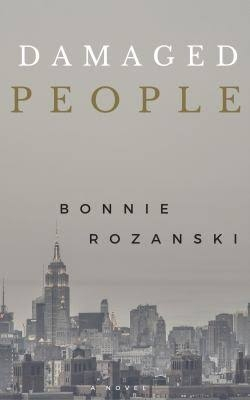Damaged People
There is a glimmer of hope at the end of this novel, in which everyday arguments are interspersed with extraordinary life events.
Spanning three generations, several decades, and two major world events, Bonnie Rozanski’s Damaged People is about how nature and nurture work within families.
The novel switches between points of view within the Siperstein family. Jack is the main protagonist throughout, and his father, Russ, is a secondary but still important character. A somewhat ordinary family, albeit very wealthy, the Sipersteins have their fair share of tragedies: death, abandonment, and affairs. In a manner true to life, things don’t work out perfectly—there’s no neat wrap-up at the end of the book.
Stricken with crippling anxiety and depression, Jack struggles emotionally and socially as a teenager and young adult, eventually settling down with the manipulative Trina. With a bevy of her own familial dramas—a menagerie of half and full siblings, Woody Allen-ish father, and a deadbeat mom—Trina brings nothing but trouble for Jack throughout the book, but he does find calmness and love in his children. Trina and Jack’s push-pull dynamic is engaging and at times frustrating, like many mismatched couples.
Switching between New York City and backwoods Canada, the young couple, both in their late teens when they marry, navigate the typical pitfalls of a young family struggling to survive with children. Jack and Trina are both fish out of water the entire time, never really meshing well together.
The novel shows the relationship predominantly from Jack’s point of view, creating a somewhat one-sided perspective of the couple. Trina’s point of view is brought in at the end of the book, but at times lacks the depth of Jack’s.
Jack’s father, Russ, was abandoned multiple times as a child by his father, a nurse, and his grandfather, creating a driven, unfeeling adult and father figure whose behaviors border on sociopathic. With Russ, there is no character betterment throughout the book; he remains the same selfish father and husband. Russ’s aunt, Grace, attempts to work out whether Jack is anxious and depressed because of how Russ raised him, or because Jack inherited those specific genes, with no real conclusion as to which is the answer.
The world of Damaged People is one of everyday arguments about dirty dishes and unmatched socks, interspersed with extraordinary life events like 9/11 and a murder plot, that seems to ask whether we are who we are because of our parents’ genes or because of how they brought us up. The glimmer of hope it suggests at the end is that no one is so broken that they can’t be fixed, if only they are willing to work for it.
Reviewed by
Jennifer Miller
Disclosure: This article is not an endorsement, but a review. The publisher of this book provided free copies of the book and paid a small fee to have their book reviewed by a professional reviewer. Foreword Reviews and Clarion Reviews make no guarantee that the publisher will receive a positive review. Foreword Magazine, Inc. is disclosing this in accordance with the Federal Trade Commission’s 16 CFR, Part 255.

